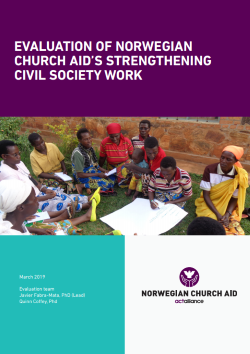
March 2019

Read the Evaluation of Norwegian Church Aid’s Strengthening Civil Society Work (pdf)
Civil society is at the core of NCA’s work. NCA works in partnership with multiple local civil society organisations (CSOs), in projects funded by Norad and other donors. From 2010–2015, civil society strengthening was a dedicated NCA programme. NCA’s 2016–2020 strategy treated it as a cross-cutting issue with its own mandatory outcome in all NCA global programmes. NCA’s partnerships with CSOs are based on principles outlined in its 2015 Partnership Policy, which include sustaining, and adding value to, partners’ work.
In 2018–19, Javier Fabra-Mata and Quinn Coffey conducted an internal evaluation of NCA’s civil society strengthening work from 2016 to early 2019. The evaluation documented how NCA Head Office and country offices understand and operationalise strengthening civil society. It assessed the impact NCA’s impact in key areas, notably advocacy and networking. It analysed how NCA plans, measures and documents its efforts to strengthen civil society and identified lessons to improve this. The evaluation used a global e-survey, key informant interviews and focus group discussions. Research participants included NCA staff in Oslo and the field, and staff from local partner organisations, government departments and resource organisations. It included country case studies from Zambia and South Sudan.
Key findings and recommendations:
No single concept or methodology defines NCA’s efforts to strengthen civil society.
NCA’s primary contribution to strengthening civil society has been through building the capacity of partner organisations. Successful interventions involved cooperation between NCA partners as well as between NCA and partners.
NCA’s partnership approach has prioritised financial, administrative and human resources (HR) capacity building, rather than leadership, governance or fundraising. NCA has not always prioritized competencies such as advocacy that could strengthen civil society.
Civil society programming is not integrated into NCA’s country strategies and programming in a systematic way. Results often focus on partners’ participation in national and regional networks, overlooking thematic programme results such as water, sanitation and hygiene (WASH) committees, village community banks (VICOBA) or women’s groups.
NCA should revise its Partnership Policy, including guidance on how to operationalise civil society strengthening.
It should adopt a systematic and broad approach to assessing and developing partners’ capacities in line with their needs.
NCA should review and update civil society planning and reporting tools.
NCA should encourage strategic thinking about, and novel approaches to, its engagement with civil society.
This report is the product of its authors, and responsibility for the accuracy of data included in this report rests with the authors alone.